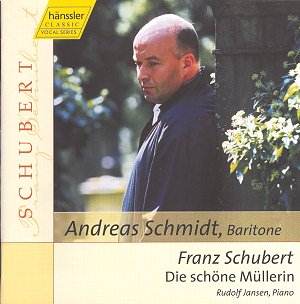Schmidt and Jansen first recorded this cycle for DG
about ten years ago. After a decade of constant work together they reasonably
feel the time has come to give us their latest thoughts.
In the case of Schmidt, it is the simplicity of his
utterance which strikes us most. In a certain sense he seems to be just
singing the work very simply in an even but now just very slightly dry-toned
voice. And yet this seems to be enough. His interpretation has the timeless
quality of a slightly bemused wanderer who sees his world falling to
smithereens all round him. Tempi in the faster songs are, to this end,
fairly moderate Ė hear Der Jäger, for example. The tempi of the
slower songs, on the other hand, remain mobile Ė there is no stagnation
and absolutely no sentimentality.
With Jansen, years of familiarity with the work seem
to have lead to a tireless research for the precise weight and colour
of every single phrase, including how to vary the strophic repetitions.
Put like this, it sounds as if the two are going opposite ways, and
in fact it does seem to be the pianist who rings the expressive changes
and the singer who reacts to them. But oddly enough it works, presumably
because they have planned it that way and honed it that way over the
years. The pianist is certainly not "carrying" the singer;
he provides a variegated expressive backdrop against which the seemingly
helpless young man moves.
Schmidt provides a note in which he points out that
this is often considered a tenorís cycle; however, when he came to terms
with it he was impressed by its overall pessimism. If your own view
is that this cycle is about a bright young man whose naive first love
brings him to tragedy you will probably be better off with a typical
tenorís interpretation, and Schmidt suggests as much. But valid interpretations
of the great Schubert cycles are almost as many as there are singers
to sing them, and Schmidtís and Jansenís way is as valid as any. I hope
you will be able to gather, from my description, whether it is a way
which will appeal to you.
Christopher Howell


